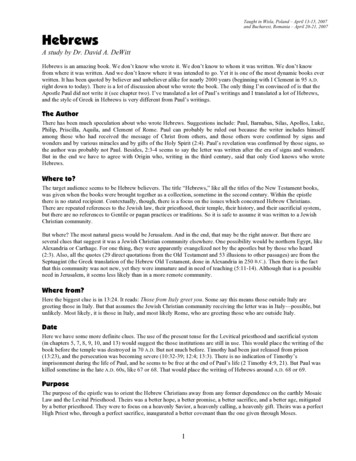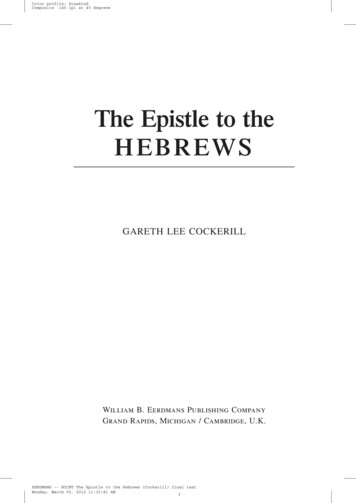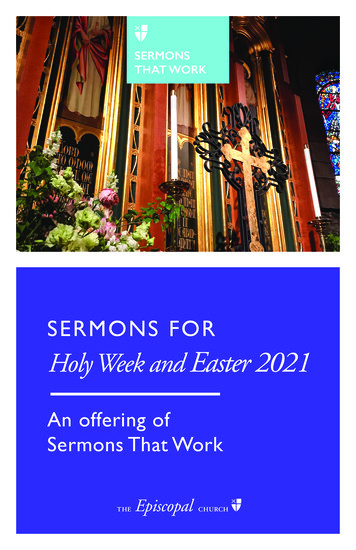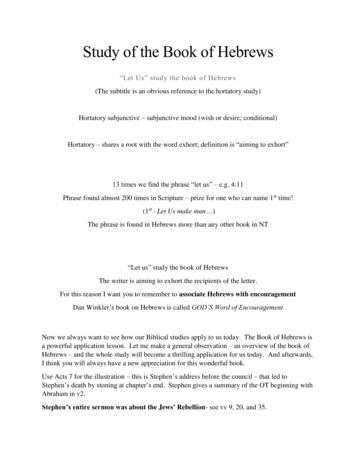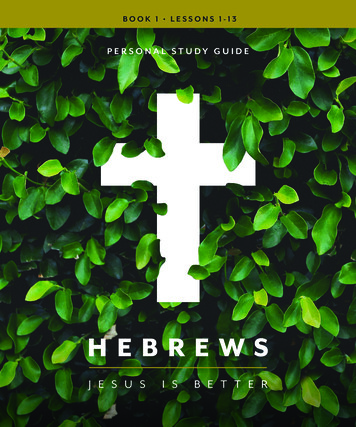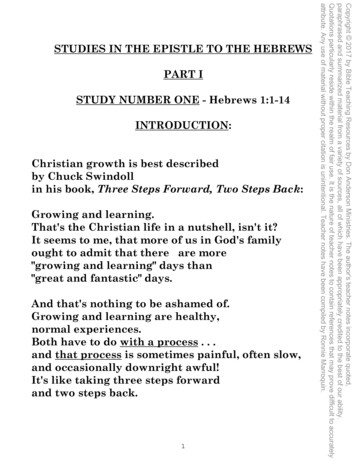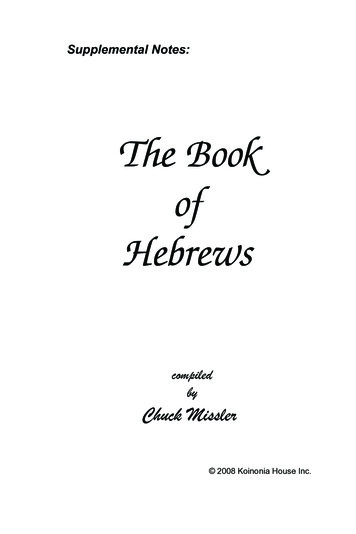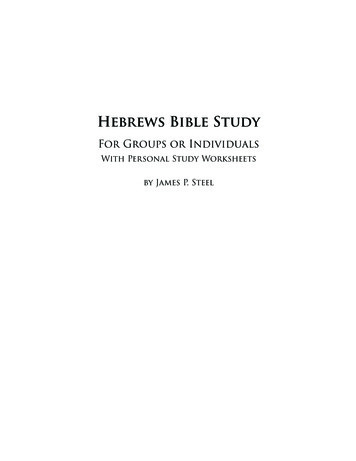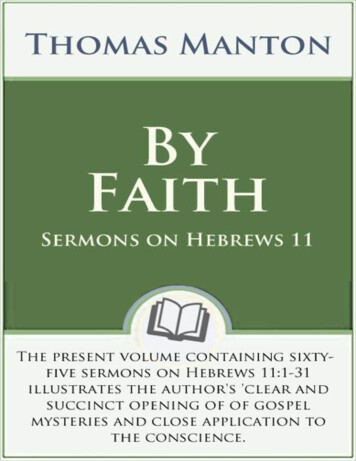
Transcription
By Faith: Sermons on Hebrews 11by Thomas MantonTable of ContentsEpistle DedicatoryTo the ReaderSERMON I. "Now faith is the substance of things hoped for," &c., ver. 1SERMON II. "Now faith is the substance of things hoped for," &c., ver. 1SERMON III. "And the evidence of things not seen," ver. 1SERMON IV. "And the evidence of things not seen," ver. 1SERMON V. "And the evidence of things not seen," ver. 1SERMON VI. "For by it the elders obtained a good report," ver. 2SERMON VII. "Through faith we understand that the worlds were framedby the word," &c., ver. 3SERMON VIII. "Through faith we understand that the worlds wereframed by the word," &c., ver. 3SERMON IX. "Through faith we understand that the worlds were framedby the word," &c., ver. 3SERMON X. "Through faith we understand that the worlds were framedby the word," &c., ver. 3SERMON XI. "Through faith we understand that the worlds were framedby the word," &c., ver. 3SERMON XII. "By faith Abel offered unto God a more excellent sacrificethan Cain," &c., ver. 4SERMON XIII. "By faith Abel offered unto God a more excellent sacrificethan Cain," &c., ver. 4SERMON XIV. "By faith Abel offered unto God a more excellent sacrificethan Cain," &c., ver. 4SERMON XV. "By faith Abel offered unto God a more excellent sacrificethan Cain," &c., ver. 4SERMON XVI. "By faith Abel offered unto God a more excellent sacrifice
than Cain," &c., ver. 4SERMON XVII. "By faith Abel offered unto God a more excellent sacrificethan Cain," &c., ver. 4SERMON XVIII. "By faith Abel offered unto God a more excellentsacrifice than Cain," &c., ver. 4SERMON XIX. "By which he obtained witness that he was righteous, Godtestifying of his gifts," ver. 4SERMON XX. "By which he obtained witness that he was righteous, Godtestifying of his gifts," ver. 4SERMON XXI. "By faith Enoch was translated that he should not seedeath," &c., ver. 5SERMON XXII. "By faith Enoch was translated that he should not seedeath," &c., ver. 5SERMON XXIII. "For before his translation he had this testimony, thathe pleased God," ver. 5SERMON XXIV. "But without faith it is impossible to please him," &c.,ver. 6SERMON XXV. "But without faith it is impossible to please him," &c.,ver. 6SERMON XXVI. "But without faith it is impossible to please God," ver. 6SERMON XXVII. "But without faith it is impossible to please him," ver. 6SERMON XXVIII. "But without faith it is impossible to please him," ver.6SERMON XXIX. "For he that cometh to God must believe that he is," &c.,ver. 6SERMON XXX. "For he that cometh to God must believe that he is," &c.,ver. 6SERMON XXXI. "For he that cometh to God must believe that he is," &c.,ver. 6SERMON XXXII. "For he that cometh to God must believe that he is,"&c., ver. 6SERMON XXXIII. "And that he is a rewarder of them that diligently seekhim," ver. 6SERMON XXXIV. "And that he is a rewarder of them that diligently seekhim," ver. 6SERMON XXXV. "By faith Noah, being warned of God of things not seenas yet," &c., ver. 7
SERMON XXXVI. "By faith Noah, being warned of God of things not seenas yet," ver. 7SERMON XXXVII. "By faith Noah, being warned of God of things notseen as yet," ver. 7SERMON XXXVIII. "Prepared an ark," ver. 7SERMON XXXIX. "By the which he condemned the world, and becameheir," &c., ver. 7SERMON XL. "By faith Abraham, when he was called to go out into aplace," &c., ver. 8SERMON XLI. "By faith Abraham, when he was called to go out into aplace," &c., ver. 8SERMON XLII. "By faith he sojourned in the land of promise, as in astrange country," &c., vers. 9, 10SERMON XLIII. "By faith he sojourned in the land of promise, as in astrange country," &c., vers. 9, 10SERMON XLIV. "Through faith also Sara herself received strength toconceive seed," &c., ver. 11SERMON XLV. "These all died in faith, not having received thepromises," &c., ver. 13SERMON XLVI. "These all died in faith, not having received thepromises," &c., ver. 13SERMON XLVII. "These all died in faith, not having received thepromises," &c., ver. 13SERMON XLVIII. "These all died in faith, not having received thepromises," &c., ver. 13SERMON XLIX. "For they that say such things declare plainly that theyseek a country," &c., vers. 14–16SERMON L. "Wherefore God is not ashamed to be called their God," &c.,ver. 16SERMON LI. "By faith Abraham, when he was tried, offered up Isaac,"&c., vers. 17–19SERMON LII. "By faith Abraham, when he was tried, offered up Isaac,"&c., vers. 17–19SERMON LIII. "Accounting that God was able to raise him up, even fromthe dead," &c., ver. 19SERMON LIV. "By faith Isaac blessed Jacob and Esau concerning thingsto come," ver. 20
SERMON LV. "By faith Jacob, when he was a-dying, blessed both thesons of Joseph," &c., ver. 21SERMON LVI. "By faith Joseph, when he died, made mention of thedeparting," &c., ver. 22SERMON LVII. "By faith Moses, when he was born, was hid threemonths of his parents," ver. 23SERMON LVIII. "By faith Moses, when he was come to years," &c., ver.24SERMON LIX. "By faith Moses, when he was come to years," &c., ver. 24SERMON LX. "Choosing rather to suffer affliction with the people ofGod," &c., ver. 25SERMON LXI. "Esteeming the reproach of Christ greater riches than thetreasures of Egypt," ver. 26SERMON LXII. "Through faith he kept the passover and the sprinkling ofblood," &c., ver. 28SERMON LXIII. "By faith they passed through the Red Sea as by dryland," &c., ver. 29SERMON LXIV. "By faith the walls of Jericho fell down," &c., ver. 30SERMON LXV. "By faith the harlot Rahab perished not with them thatbelieved not," &c., ver. 31SERMONS UPON THE ELEVENTHCHAPTER OF HEBREWSTHE EPISTLE DEDICATORYTo the High and Mighty Prince WILLIAM, By the Grace of God, King ofEngland, France and Ireland, &c.
MAY IT PLEASE YOUR MAJESTY,—THIS relict of the worthy deceased author was long since intended, whenyou were at a greater distance, to be sent abroad under the patronage ofyour great name. His own name indeed hath long been, and stillcontinues, so bright and fragrant in England that your Majesty'scondescending goodness will count it no indignity to yours to impartsome of its more diffused beams and odours to it. However, if what therewas of presumption in that first intention can be pardoned, no reason canbe apprehended of altering it upon your nearer and most happy approachunto us.The kind design and blessed effect whereof, compared with the scope anddesign of this excellent work, do much the more urgently invite to it; foras you come to us with the compassionate design of a deliverer, and thewonderful blessing of heaven hath rendered you also a victor and asuccessful deliverer, the design of this book is to represent that faithwhich is the peculiar and most appropriate principle of what is (like yourown) the most glorious of all victories. You have overcome, not by thepower of your arms, but by the sound of your name, and by yourgoodness and kindness, which so effectually first conquered minds as toleave you no opportunity of using the other more harsh and ruggedmeans of conquest. Yea, and your success is owing to a greater name thanyours; our case, and the truth of the thing, allow and oblige us in a lowand humble subordination to apply those sacred words, 'Blessed is hethat cometh to us in the name of the Lord,' the power of which gloriousname is wont to be exerted according as a trust is placed in it. Weacknowledge and adore a most conspicuous divine presence with you inthis undertaking of yours, which is not otherwise to be engaged than bythat faith of which the apostle and this author do here treat. This faith, weare elsewhere told, overcomes this world; and are told here in what way—by representing another, with the invisible Lord of both worlds, being thesubstance of what we hope for, and the evidence of what we see not, andwhereby we see him who is invisible. This world is not otherwise to beconquered than as it is an enemy; it is an enemy by the vanities, lusts, andimpurities of it. That faith which foresees the end of this world, whichbeholds it as a vanishing thing, passing away with all the lusts of it,—
which looks through all time, and contemplates all the affairs and eventsof this temporary state as under the conduct and management of an allwise and almighty invisible Ruler,—which penetrates into eternity, anddiscovers another world and state of things which shall be unchangeableand of everlasting permanency, and therein beholds the same invisibleglorious Lord, as a most gracious and bountiful rewarder of such as serveand obey him with sincere fidelity in this state of trial and temptationhere on earth,—such a faith cannot but be victorious over all the lusts,vanities, impurities, and sensualities of this present evil world. Such afaith, working by love to God and good men, and all mankind, and beingthereupon fruitful in the good works of piety, sobriety, righteousness andcharity, will be the great reformer of the world, conquer its malignity,reduce its disorders, and infer a universal harmony and peace.Even among us the noblest part of your Majesty's conquest is yet behind.It cannot but have been observed, that for many years by-past a designhath been industriously driven that we might be made papists, to make usslaves; and for the enslaving us, to debauch us, and plunge us into allmanner of sensuality, from a true apprehension, that brute and slave arenearest akin, and that there is a sort of men so vile and abject (as theingenious expression of a great man among the Romans once was) quosnon decet esse nisi servos—to whom liberty were an indecency, and whoshould be treated unbecomingly if they were not made slaves, that weshould be fit to serve the lusts and humours of any other man, when oncewe were become servile to our own. And next, that the religion mighteasily be wrested away from us which was become so weak and impotentas not to be able to govern us; and that if humanity were eradicated, theprinciples and privileges that belong to our nature torn from us, easywork would be made with our Christianity and religion. What hath beeneffected among us by so laboured a design, through a long tract of time, isbefore you as the matter of your remaining victory, which, as on our part,will be the more difficult, where the pernicious humour is inveterate. Soyour majesty's part herein will be most easy, your great example being,under the supreme power, the mover, the potent engine which is to effectthe hoped redress, and your more principal contribution hereuntoconsisting but in being yourself, in expressing the virtue, prudence,goodness, and piety, which God hath wrought into your temper. The
design of saying this is not flattery, but excitation. Give me leave to laybefore your Majesty somewhat that occurs in a book written twenty-sevenyears ago, not by way of prophecy, but probable conjecture of the waywherein a blessed state of things in these parts of the world is likely to bebrought about:—'God will stir up some happy king or governor, in some country ofChristendom, endued with wisdom and consideration, who shall discernthe true nature of godliness and Christianity, and the necessity andexcellency of serious religion, and shall place his honour and felicity inpleasing God and doing good, and attaining everlasting happiness, andshall subject all worldly respects unto these high and glorious ends; shallknow that godliness and justice have the most precious name on earth,and prepare for the most glorious reward in heaven,' &c.With how great hopes and joy must it fill every upright heart daily (asthey do) to behold in your Majesty and in your Royal Consort, (whom adivine hand hath so happily placed with you on the same throne) thesame lively characters of this exemplified idea! It cannot but inspire uswith such pleasant thoughts that winter is well-nigh gone, and the time ofsinging of birds approaches; the night is far spent and the day is at hand,—a bright and glorious morning triumphs over the darkness of a foul,tempestuous night. The sober, serious age now commences, whensensuality, falsehood, cruelty, oppression, the contempt of God andreligion are going out of fashion; to be a noted debauchee of a vicious lifeand dishonest mind, capable of being swayed to serve ill purposeswithout hesitation, will no longer be thought a man's praise, or aqualification for trusts. It shall be no disreputable thing to profess thefear of God and the belief of a life to come. A scenical, unserious religion,a spurious, adulterated Christianity, made up of doctrines repugnant tothe sacred oracles, to sound reason, and even to common sense, withidolatrous and ludicrous formalities, and which hates the light, shallvanish before it. There shall be no more strife about unnecessarycircumstances; grave decencies in the worship of God that shall be selfrecommending, and command a veneration in every conscience, shalltake place. There shall be no contention amongst christians; but whoshall most honour God and our Redeemer, do most good in the world,
and most entirely love and effectually befriend and serve one another,which are all things most connatural to that vivid realising, victoriousfaith here treated of.Nor are other victories alien to it, over the armed powers of God's visibleenemies in the world, such as he may yet call your Majesty with glorioussuccess to encounter in his name, and for the sake of it. In some followingverses of this chapter (wherein the line of the apostle's discourse wentbeyond that of this worthy author's life) this is represented as thepowerful instrument which those great heroes employed in their highachievements of subduing kingdoms, working righteousness, or executingGod's just revenges upon his unyielding enemies, obtaining promises,stopping the mouths of lions, quenching the violence of fire, escaping theedge of the sword, whereby out of weakness they were made strong,waxed valiant in fight, turned to flight the armies of the aliens. By thisfaith they (in the prophet's lofty style, Isa. 34:5), as it were, bathed theirsword in heaven, gave it a celestial tincture, made it resistless andpenetrating. This is the true way, wherein, according to the divinestphilosophy, the spirit of a man may draw into consent with itself theuniversal almighty Spirit. And if the glorious Lord of Hosts shall assign toyour Majesty a further part in the employments of this noble kind, mayhe gird you with might unto the battle; may your bow abide in strength,and the arms of your hands be made strong by the hands of the mightyGod of Jacob, even by the God of your fathers, who shall help you, and bythe Almighty who shall bless you; and may he most abundantly bless youwith blessings of heaven above, blessings of the deep that lieth under,blessings of the breasts and of the womb. May he cover your head in fight,and crown it with victory and glory, and grant you to know, by use andtrial, the power of that faith, in all its operations, which unites God withman, and can render, in a true and sober sense, and to all his ownpurposes, an human arm omnipotent. Which is the serious prayer ofYour Majesty's most devoted and most humble servant and subject,JOHN HOWE.
TO THE READERTHOU art here presented with a third volume of the works of the latereverend and learned Dr Thomas Manton, whose great name is sufficientto recommend it to thy perusal, when thou art assured it is his own.These sermons and treatises were either written from his own notes, orcarefully compared verbatim with them, and amended by them; andwhosoever were acquainted with the spirit and preaching of the authorwill find he hath no cause to suspect being imposed on herein. Hiscopious invention, clear and succinct opening of gospel mysteries, closeapplication to the conscience, with that admirable variety of handling thesame subject which sometimes occurs, are scarce imitable by any. It wereneedless to add anything to the testimonies that have been given him bythose who have published his former works.What the author's opinion about publishing posthumous works was mayjustify what of this kind hath been already done and is now tendered tothee, which I shall give you in his own words in his epistle before DrSibb's 'Comment on the 1st. Chapter of the 2d Epistle to theCorinthians:'—'Let it not stumble thee that the work is posthume, andcometh out so long after the author's death; it were to be wished thatthose that excel in public gifts would during life publish their ownlabours, to prevent spurious obtrusions upon the world, and give themtheir last hand and polishment; as the apostle Peter was careful to writebefore his decease, 2 Peter 1:12–14; but usually the church's treasure ismost increased by legacies. As Elijah let fall his mantle when he wastaken up into heaven; so God's eminent servants, when their personscould no longer remain in the world, have left behind them some worthypieces as a monument of their graces and zeal for the public welfare,whether it be out of a modest sense of their own endeavours, as beingloath upon choice, or of their own accord, to venture abroad into theworld, or whether it be that being occupied and taken up with otherlabours, or whether it be in a conformity to Christ, who would not leavehis Spirit till his departure, or whether it be out of a hope that their workswould find a more kindly reception after their death, the living beingmore liable to envy and reproach; but when the author is in heaven, thework is more esteemed upon earth. Whether for this or that cause,
usually it is that not only the life, but the death, of God's servants hathbeen profitable to his church, by that means many useful treatises beingfreed from that privacy and obscureness to which by the modesty of theauthor they were formerly confined.'To all this may be added that not many days before the author departedthis life he declared his intentions of publishing something himself buthis sudden death prevented him.And let none wonder that in the author's so constant course of preachingthe same matter may sometimes recur. In some places thou wilt findnotes of reference; in others the same matter is handled with such varietyas to prevent tediousness, in which the author had a singular excellency.However, repetitions of the same truths have their use. 'To write the samethings to you,'saith the apostle, 'to me is not grievous, for you it is safe,'Phil. 3:1. Our knowledge is imperfect, and needs a continual increase; ourmemories are slippery and frail, and need to be refreshed; our attention isdull, and many truths slip by us at the first hearing without regard; ourhearts are backward to our duty, and we need frequently to be excited.We more blame a dull horse than the rider, who frequently quickens himwith a spur. It savours too much of pride of knowledge, and a curious itchof novelty, when we cannot endure to hear more than once of the sametruths; and such a humour is not to be gratified, but mortified. Butthough some may quarrel, I doubt not but the serious christian willreceive benefit by what is here offered, which, that it may be thy lot, is theearnest prayer ofThy affectionate servant in the work of the gospel,WILLIAM TAYLOR.SERMONS UPON HEBREWS XISERMON I
Now faith is the substance of things hoped for, the evidence of thingsnot seen. HEB. 11:1.IN the close of the former chapter the apostle had spoken of living byfaith, and thereupon taketh occasion to show what faith is. He that wouldlive by faith had need search out the nature of it; an unknown instrumentis of little use. It is true, a man may act faith that cannot describe itartificially, as an infant may live, that doth not know what life is; buthowever, it is more comfortable when our thoughts are distinct, explicit,and clear, concerning the nature of those graces that are so necessary forus, and the christian life is much more orderly, and less at random andperadventure. And therefore the apostle, to teach them this holy art ofexercising faith, and living by faith to more advantage, he gives them herean excellent description of it, 'Now faith is the substance,' &c.In the words there is the thing described, and the description itself. Thething described is Faith; the description is this, 'It is the substance ofthings hoped for,' &c. The description is proper, according to the rules ofart, Habitus distinguuntur per actus, et actus per propria objecta, habitsare described by their formal acts, and acts restrained to their properobjects; so faith is here described by its primary and formal acts, whichare referred to their distinct objects. The acts of faith are two; it is thesubstance, it is the evidence. Think it not strange that I call them acts, forthat is it the apostle intends, therefore Beza says, in rendering this place,he had rather paraphrase the text, than obscure the scope; and heinterpreteth it thus—Faith substantiates or gives a subsistence to ourhopes, and demonstrates things not seen. There is a great deal ofdifference between the acts of faith, and the effects of faith. The effects offaith are reckoned up throughout this chapter; the formal acts of faith arein this verse. These acts are suited with their objects. As the matters ofbelief are yet to come, faith gives them a substance, a being, as they arehidden from the eyes of sense and carnal reason; so faith gives them anevidence, and doth convince men of the worth of them; so that one ofthese acts belongs to the understanding, the other to the will. By the onefaith is a convincing demonstration, and by the other a practicalapplication. By the one act it turns hope into some kind of presentfruition and by the other things altogether invisible are represented to the
soul with clearness and certainty. In short, by faith things hoped for havea being; things not seen have an evidence.I shall discuss the parts of the text as they lie in order.First, I begin with the first act and object, 'Faith is the substance of thingshoped for.'1. Let me open the phrases. Faith is sometimes taken for the doctrine offaith, and sometimes for the grace of faith. Some take liberty to expoundit of the former, the doctrine of faith, that is, the substance of thingshoped for. I confess the words agree well, but not the scope; the doctrineof faith, Fides quœ creditur, is the substance of things hoped for; theword and faith do come under one description. But the apostle's drifthere is to show, not what we do believe, but how we live by faith;therefore the grace is here understood, not the doctrine. Now the grace offaith is considered here, not as it justifies but rather as it sanctifies, as it isan instrument in the spiritual life. He speaketh of those acts which faithdiscovereth most in its use and exercise to baffle temptations, and tomake us stand our ground under sore assaults, troubles, andpersecutions.Now this faith is the 'substance,' ὑπόστασις; that is, the word. Somedifference there is about the rendering of it; the most usual significationsof it are confidence and substance. Sometimes it is put for confidence,and for a firm and resolved expectation; as Heb. 3:14, 'We are madepartakers of Christ, if we hold the beginning of our confidence firm, orsteadfast unto the end,' ἀρχην τῆς ὑποστάσεως, it is the same word; butthere we render it confidence; and it seems to be parallel with ver. 6, 'Ifwe hold fast the confidence, and the rejoicing of the hope, firm unto theend.' So 2 Cor. 9:4, 'In this confident boasting,' ὑποστάσει ταύτῃ τῆςκαυχήσεως, it is the same word. And thus the Septuagint translates theHebrew word, which they render sometimes by spes, sometimes byhypostasis; and so in profane authors, Plutarch calls those that stand outafter the field is won, ὑφισταμένους, because of their great confidence.Polybius calleth the valorous resistance of Horatius Cocles, ὑπόστασιν,which use of the word is proper to the original of it, ὑφίστασθαι, firmiterstare.
2. The second explication is the substance. The word signifies substanceor subsistence; because confident expectation gives our hopes a kind ofpresent or actual being, and apprehends things to come as present andsubsisting, and causes them to work, as if they were already enjoyed;therefore our translators, fitly I conceive, render it here substance, saiththe Greek scholist, τὰ ἐν ἔλπισιν, &c. Though things in hope are absentand to come, yet in the certain firm expectation and persuasion of thebeliever, they are present and real; so that the meaning is, faith doth notonly look out with cold thoughts about things to come, but causes them towork as if they had already a being, and the believer were in thepossession and enjoyment of them. And in this sense it is the substance ofthings hoped for; it gives them a being, while it beholds them in theiroriginal fountain, which is the word of promise; and while it unites andjoins the soul to them by earnest hope, which is as it were an anticipationof our blessedness, and a pre-occupation of the joys of the world to come,faith causeth such a subsistence and fiducial presence of the things hopedfor in the mind of a believer, as that he concludes not only that they maybe, or shall be, but that they already are. Faith is the substance, and that'of things hoped for;' so he calls all the blessings of the covenant whichare not yet enjoyed. Many things indeed were hoped for by the patriarchs,and believers of the old testament, which are now past, which are mattersof mere belief, and not of hope to us, and so come under the latterdescription of faith, the evidence of things not seen, as the incarnation ofChrist: yet their faith made those things present to them: John 8:56,'Your father Abraham rejoiced to see my day.' Abraham saw that day, andhad a distinct view of it, though they were to them things hoped for; yetwe believe them, though we do not see them. But there are other thingswhich are only promised by God, and not yet enjoyed, that are simplematters of hope—as the general resurrection, the happiness of theglorified estate. Now faith doth as it were give a real being to them as ifthey were present. But then there are other things that may be enjoyed inthis world, though not for the present, yet in some season; as the graciouspresence of God, and his favourable returns after absence, and someestrangement, and deep affliction; these things may also be comprised inthis expression, being things we hope for according to promise, andthough they be absent, faith gives them a being and presence. You willfind faith to be a kind of prophetic grace; for to faith, when God is absent,
yet then he is present; when he hides his face, faith can look behind theveil, and there see fatherly love, and a God of mercy. And in scriptureupon this account the children of God answer themselves, and antedatetheir praises. When they ask anything of God in prayer, faith asks andanswers itself; it makes the help and mercy present which we askaccording to God's will: Ps. 6:4, 'Return, O Lord, deliver my soul;' then heanswers himself, ver. 8, 9, 'The Lord hath heard the voice of my weeping;the Lord hath heard my supplication.' But chiefly the expression reflectsupon and is meant of those blessings which are only in expectation, andnever in actual and complete enjoyment in this world, as heaven and theglory of the everlasting state; faith gives a being and real subsistence inthe soul to the glory that is yet to be revealed.Obj. I have done with the exposition, only here is a doubt; does not thisconfound faith and hope, to make things hoped for to be the object offaith, for graces differ in their objects?Sol. I answer, There is a link between the graces, but no confusion; theyare akin, but not confounded one with another. Blessedness to come is anobject of faith, and an object of hope; it is an object of faith as it is presentin the promises, or present in our hearts; and an object of hope in regardof its futurity, as it is yet to come. Faith is the ground of hope. Faithbelieveth, and hope expecteth. Faith first closeth with verbum Dei, theword of God, that assures us of such a blessedness; then hope is carriedout towards rem verbi, the thing promised. Faith makes all things certain,and in a sort already present; but hope looks out for a fullaccomplishment. Faith gives us a right, and persuades us of the truth ofthings promised, and hope looks after the manifestation of them inpossession. Faith is the hand, and hope is the eye of the soul. Faith layshold upon the promise, and hope looks out after the things promised.Faith awakens hope, and hope cherishes faith, bringing in constantsupport to it.Out of this first clause let me observe—Doct. That a lively faith doth give such a reality, certainty, and presentbeing to things hoped for and yet to come, as if they were already actuallyenjoyed.
And thus it is said of Abraham, John 8:56, that 'he saw Christ's day.'Though there were many successions of ages between Christ andAbraham, yet faith made it present, represented it as if it were before hiseyes; 'he saw my day,' not by a naked supposition but by real prospect,such as wrought upon his heart, and 'he was glad,' and leaped for joy. Andso in this sense a believer is said to have eternal life, John 3:36. He is notonly sure of it when he dies, but hath it here in some sense: Heb. 11:13,'These all died in faith, not having received the promises, but having seenthem afar off.' Without faith we cannot see things at a distance. Here Ishall show—1. How faith doth this.2. The benefit and advantage of this property of faith in the wholebusiness of the spiritual life, how this is the great ground of our living byfaith.First. How does faith give a subsistence or present being to things hopedfor? How can we be said to have that happiness which we do but expect?I answer: Faith takes possession four ways—(1.) Spe, by hope. (2.)Promissis, in the promises. (3.) Capite, in our head. (4.) Primitiis, in thefirst-fruits.1. Spe. By a lively hope it doth as it were sip of the cup of blessing, and
By Faith: Sermons on Hebrews 11 by Thomas Manton Table of Contents Epistle Dedicatory To the Reader SERMON I. "Now faith is the substance of things hoped for," &c., ver. 1 SERMON II. "Now faith is the substance of things hoped for," &c., ver. 1 SERMON III. "And the evidence of things not seen," ver. 1 SERMON IV. "And the evidence of things not .
